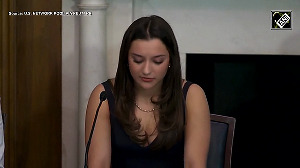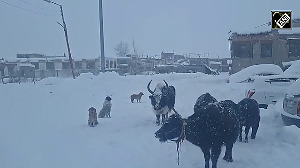The police on Tuesday arrested the father of a 17-year-old boy, who in an inebriated state allegedly crashed his speeding high-end car into a motorcycle killing two software engineers in Pune, and four executives of restaurants for serving liquor to the minor, officials said.

he car, a Porsche, allegedly driven by the boy, who the police claim was drunk at the time of the accident, fatally knocked down two motorbike-borne IT engineers in Kalyani Nagar in the early hours of Sunday. The minor was granted bail by the Juvenile Justice Board hours after the crash.
As the horrific crash caused a nationwide outrage, Maharashtra deputy Chief Minister Devendra Fadnavis, who holds the home portfolio, expressed shock and surprise over the JJ Board taking a "lenient view" of the fatal car accident and granting bail to the accused, and pushed for trying the teenager as an adult.
"The father of the teenager boy was placed under arrest on Tuesday evening hours after he was detained from Maharashtra's Chhatrapati Sambhajinagar," said Amitesh Kumar, commissioner of police.
The man, a real estate developer, will be produced before a court on Wednesday, he said.
The police had registered a case against the teenager's father under sections 75 and 77 of the Juvenile Justice Act and relevant sections of the Indian Penal Code. Section 75 deals with "willful neglect of a child, or exposing a child to mental or physical illnesses," while section 77 deals with supplying a child with intoxicating liquor or drugs.
A case has been registered against the boy under section 304 (culpable homicide not amounting to murder ) of the IPC and provisions of the Motor Vehicles Act.
According to the FIR lodged in connection with the incident, the man, despite knowing his son did not have a valid driving license, gave him the car, thus endangering the latter's life. He also allowed him to party despite knowing he consumes liquor.
The deceased were identified as Anish Awadhiya and Ashwini Koshta, both 24-year-old IT professionals hailing from Madhya Pradesh and working in Pune
Meanwhile, a Pune court on Tuesday remanded three accused - an owner and two managers of different restaurants -- where the boy consumed liquor along with his friends before getting behind the wheel of the car -- to police custody till May 24 in the case.
The accused -- Naman Pralhad Bhutda, the son of Cosie restaurant owner, its manager Sachin Katkar, and the manager of Blak Club hotel Sandip Sangle - were produced before the court.
While seeking their custody for seven days, the prosecution told the court that the establishments owned or managed by the accused served liquor to the boy and his friends without confirming his age (legal age of drinking is 21).
Police told the court they have served a notice to Pralhad Bhutada, the owner of Cosie restaurant,
asking him to make himself available for questioning as and when required.
According to the police, though Pralhad Bhutda is the owner of the establishment, he does not look after day-to-day management of the hotel.
The state excise department, on Pune district collector orders, has sealed the two establishments.
Police commissioner Kumar said another accused, Jayesh Bonkar, is a staffer at Blak Club hotel and he was also arrested.
Amid the slew of developments, deputy CM Fadnavis made a surprise visit to the Pune police commissionerate to take a review of the case, and later addressed the media.
"I took a review of the case. I also discussed with officials what steps can be taken to prevent such incidents," he said.
Fadnavis said after the crash, the police immediately invoked IPC section 304 along with relevant provisions and in its remand plea before the JJB, mentioned that since the teenager was 17 years and eight months old, he should be treated as adult.
"After the (2012) Nirbhaya case (of Delhi), there was an amendment in the law stipulating that in heinous crimes, juveniles (accused) who are above 16 should be tried as adults. Taking this point, the Pune police sought permission to allow them to treat the juvenile (in Pune crash case) as an adult. However, the board took a different stand," Fadnavis maintained.
He said the JJB took a "lenient view" on remand report filed by the police and granted bail to the boy on grounds he will do community work for 15 days and write an essay of 300 words on road safety."
"The order (granting bail) passed by the JJB was shocking and surprising and it aggravated the public outrage," the deputy CM opined.
The police moved an application in a higher court challenging the JJB order.
"The court, however, asked the police to again approach the Board and file a petition for revision of the order. The court also said if the JJ Board does not review its order, then police can approach the higher court," he said.
Fadnavis said the police have approached the JJB for a revision of its order and a decision is expected by Wednesday.
He said the police will do whatever it takes to ensure justice in the case.
"The police have taken the case seriously and they will not tolerate someone getting bail despite fatally knocking down two persons," Fadnavis asserted.
Concerns have been raised regarding pubs and restaurants where age checking is lax, he said.
"The police have been asked to enforce rules meant for liquor serving establishments. Instructions have also been given to curb drunken driving," said Fadnavis.











 © 2025
© 2025